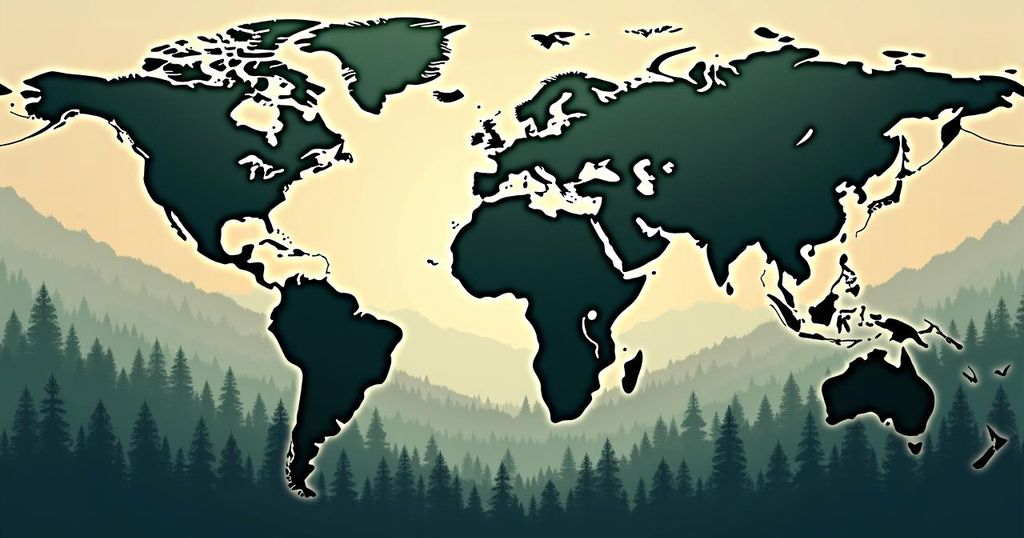According to a new study, global deforestation reached alarming levels in 2023, with the loss of 6.37 million hectares of forest, far exceeding necessary limits to meet the promise of halting deforestation by 2030. The report highlights significant increases in deforestation in Bolivia and Indonesia, while Brazil shows mixed results, with some improvements in the Amazon but heightening risks in other areas. Urgent policy changes and a reevaluation of consumption and production are imperative to address this crisis.
Deforestation rates continue to surge globally, as evidenced by a significant study released on Tuesday, which reports that extensive forest areas equivalent to almost the size of Ireland were lost in the past year. Conducted by a consortium of research organizations, non-governmental organizations, and advocacy groups, the findings indicate that 6.37 million hectares (approximately 15.7 million acres) of forest were cleared and incinerated in 2023. This rate of deforestation is far beyond what is required to meet the global commitment, established in 2021 by over 140 leaders, to eliminate deforestation by the year 2030. Forests, essential for supporting 80 percent of the Earth’s terrestrial plant and animal species, play a critical role in regulating water cycles and sequestering carbon dioxide—a key greenhouse gas driving climate change. Ivan Palmegiani, a biodiversity and land use consultant at Climate Focus and lead author of the “Forest Declaration Assessment” report, stated, “Globally, deforestation has gotten worse, not better, since the beginning of the decade.” In 2023 alone, approximately 3.7 million hectares of precious tropical primary forest were destroyed, despite expectations that this figure should have decreased significantly to meet the ambitious 2030 deforestation goal. The report identifies Bolivia and Indonesia as high-risk areas demonstrating significant setbacks in forest conservation efforts. Bolivia experienced a staggering 351 percent increase in deforestation between 2015 and 2023, largely attributed to agricultural expansion for soya, beef, and sugar production. Conversely, while Indonesia seen a decline in deforestation from 2020 to 2022, the rate escalated dramatically in the last year, driven by rising demands for materials perceived as environmentally sustainable—such as viscose for textiles—and a boom in nickel mining, essential for electric vehicle batteries and renewable energy technologies. On a slightly optimistic front, Brazil, despite remaining the nation with the highest deforestation rates, has made strides in improving the situation in the Amazon rainforest through protective governmental measures implemented by President Luiz Inacio Lula da Silva. However, deforestation has notably increased in the Cerrado region, a vital tropical savanna lying beneath the Amazon. The report further sheds light on the detrimental effects of logging, road construction, and uncontrolled fires contributing to forest degradation—instances where land remains damaged but not entirely cleared. In 2022, it was recorded that forest degradation covered an area twice the size of Germany. Erin Matson, a senior consultant at Climate Focus and co-author of the report, emphasized, “strong policies and strong enforcement” are essential for effective forest protection, arguing that ensuring such protections remains impervious to political and economic fluctuations is paramount. The timing of this report coincides with the European Commission’s recent proposal to delay the implementation of its anti-deforestation law by one year, raising concerns among NGOs regarding the commitment to forest conservation. Matson concluded by stating, “We have to fundamentally rethink our relationship with consumption and our models of production to shift away from a reliance on over-exploiting natural resources.” In summary, this comprehensive report underscores an urgent need for intensified global efforts to combat deforestation, calling for the reevaluation of consumption habits and production models to safeguard critical forest ecosystems.
The ongoing crisis of deforestation poses a considerable threat to biodiversity, climate stability, and the overall health of the planet. Forests are integral to the Earth’s ecosystem, providing habitat for countless species and serving as vital carbon sinks. Despite international pledges to halt deforestation by 2030, recent data suggests that loss rates have escalated alarmingly, with significant implications for global efforts to mitigate climate change. Countries such as Bolivia and Indonesia face unprecedented challenges regarding forest conservation, while Brazil’s situation presents a mixed picture of progress hindered by continued deforestation in certain areas. With considerable economic pressures driving forest destruction, the need for robust policies and a shift in consumption practices is more critical than ever.
The stark findings of this report highlight the urgency with which the global community must respond to the escalating crisis of deforestation. As rates continue to surpass ambitious targets set for 2030, it is essential to implement effective policies and strategies that prioritize forest protection while addressing the economic drivers of deforestation. The call for a deeper reevaluation of consumption habits and production models reflects the broader need to align global priorities with sustainable practices that safeguard vital forest ecosystems for future generations.
Original Source: phys.org







